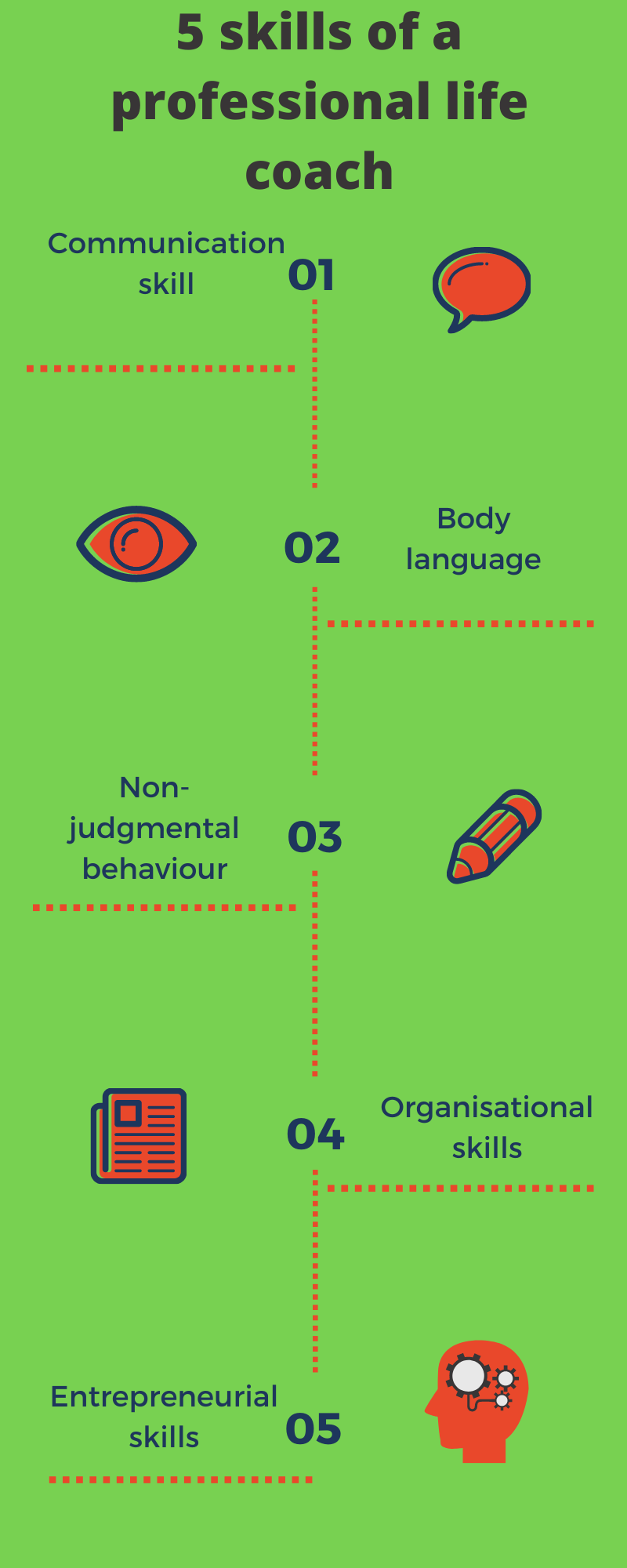Do you know what is motivational life coaching? How much you can make as a life coach? Do you want to know more about the demand for this profession in the UK?
In 2019, UK Coaching commissioned You Gov surveyed 50,000 adults and 2,000 children. They were asked about their experience of receiving coaching and their experience of being a coach. 6% of adults coached sport or physical activity which equates to an estimated 3 million coaches in the UK. Furthermore, an estimated 900,000 people support coaches in a coach development program.
As you are looking for the details about this profession we assume that you have the answers in your mind. But if not, then don’t worry! We will be discussing all the related topics you want to know about.
Let’s have a look at the topics we will be discussing:
- Duties of a motivational life coach
- Working sectors
- Qualifications & Certification
- Salary and Working hours
- Salary and Working hours
- List of 5 essential skills to become a professional
Table of Contents
What are the duties of a motivational life coach?
You must be wondering what are the duties and responsibilities of a life coach. Well, a motivational life coach is needed in every sector. Their primary job is to guide others to achieve their goals.
A life coach works as a connector. He shows the skills that are to be improved at present. They also inspire others about how to use their efficiency in full scale. They focus on how to improve the career of their client in the future.
Moreover, the coach also has to help clients to overcome any obstacles they face. He prepares a step-by-step journey plan for his clients. He works as their mentor to reduce their errors and improve efficiency.
So, as a life coach you will be doing the followings for your clients:
1. Guide your clients to broaden their perspective and open their mind. So that they can achieve their desired goal.
2. Build their trust in their self-worth and self-belief. And also help them regenerate their confidence.
3. Help them to set their goals and create an action plan to achieve it.
4. Keep patience while listening to your clients before you start working.
5. Remove all negative/limiting self-beliefs from their mind.
6. Support them to get rid of their fears and anxieties.
7. Improve communication skills between you and your clients.
Working sectors of a life coach
Although there are various sectors available to work as a life coach. But, it is wise to work on one individual sector at a time. It requires proper research and preparation to guide others according to their problems and needs. So, working on different projects at the same time might cause chaos.
As a motivational life coach, you will be working in the following sectors:
1. Performance Coaching
Performance coaching helps to build and maintain effective employee and supervisory relationships. It helps to develop a plan to generate new skills among the employees. A trainer will work on training, new assignments, job enrichment, self-study, or work details. It will develop and improve an employee’s capability to perform and to correct poor performance.
2. Career coaching
In career coaching, people look for suggestions and instructions to build their career. Here the goal is to support them in making decisions about their career development. You are required to help them in creating their resumes, cover letters, LinkedIn profiles—to meet their goals. The focus of a career coach is to help people assess their professional situations. They are required to do so with a greater degree of honesty, curiosity, empathy and compassion.
3. Relationship coaching
Relationship matters, whether it’s a personal, intimate, or business. Relationship coaching gives others a chance to explore their feelings. You’ll need to find out what they want for themselves. This knowledge will stop them from projecting their needs on others. Relationship coaching focuses on the emotional well-being of the client(s). It also emphasizes the person’s social, emotional & intimate life.
4. Physical fitness coaching
A fitness coach aims for the well-being of the client. He is more focused on what the person needs than what he wants. As a coach, his duty includes nutrition, weight-loss, lifestyle, performance, and the fitness of the client. A good coach listens to the trainee and provides the suggestions they need. He encourages the client to boost up their morality. So that they can achieve what they desire.
5. Financial coaching
A financial coach works with the clients to find out the error in their money management system. The duty includes figuring out which expenses are working, which aren’t. They find out the reason behind the problem and suggest a solution. They can also help with emotional or behavioural issues of the clients.
A financial coach won’t provide investment recommendations. But he or she will create a system to track their income and expenses; set real and attainable goals. They do the foundational work to prepare clients for the emotional challenges. Which will help them while pursuing their financial goals.
6. Addiction Coaching
An addiction life coach deal with the individuals’ addiction to alcohol, drugs, and any number of other types of addictive behaviours. The coach often asks a series of questions and offer helpful suggestions and strategies to aid the person in recovery. Addicts often find life coach services very resourceful. Since they need help with more than just substance abuse issues.
7. Spiritual Coaching
As a spiritual coach, you will help others to connect with their true personality. A spiritual coach helps others to learn about the laws of nature. You have to uncover their desires, help them to take steps towards their goals and achieve their dreams.
Action Plan
The duty and responsibility of a coach depending on the type of job and the clients. Different clients have different problems which need varies strategies for the solutions. But all type of coaching has some common duties to perform. Such as:
- Listen to the clients carefully and understand the problem.
- Ask relevant questions, find out their needs and goals.
- Researching and finding probable solutions.
- Create an action plan and strategy that the client will follow
- Record the progress, find out errors and change the plan if needed.
- Ask for feedback from the client and make necessary changes according to their need
- Give suitable suggestions and let the client know about the progress.
Other than these duties you also have some other responsibilities as a professional in the sector. You are required to maintain the confidentiality of the clients. You have to follow the Code of Ethics while working with individual clients. Also, you are trying to bring a positive change in clients. But as they are going through the changes, that’s why you have to motivate them through the process.
Life Coach Qualifications & Certification
To start the career as a life coach you do not need an academic degree. Yes, that’s true! Life coaching falls under the non-regulated industry in the UK. This means that there are no laws that govern this field. There is no licence required to become a life coach
So, if you are passionate about the career as a life coach then you can start at any time. You do not need an academic degree to be a life coach. Because life coach training organisations do not need to be accredited by a governing body. Moreover, there exists no accrediting institution in the field of life coaching.
In this scenario, a new question will arise in your mind. Can anyone become a professional Life Coach in the UK? Well, anyone can but everyone will not be appreciated by the clients. You will own some skill to impress the clients that you are the right person for the job.
The certification process of a professional in this sector is non-academic. That means you do not have to go through college or university to get the certification. You can join online courses and develop skills that help to build your career.
We have a suggestion for you here. You can join the course offered by One Education on Life Coaching Online Accredited Course. This course is accredited by Continuing Professional Development (CPD). It is a recognised independent accreditation service in the UK.
This professional course will help you to learn about life coaches and life coaching. You will get the idea to build your own life coaching business. You can complete the course at a convenient time. Also, you will get the certification at hand after completing the course successfully.
Salary and Working hours of a Motivational Life Coach
Salary
Life coaches work as a self-employed agent. So, the salary and working hours depend on various factors like the number of clients, working sector, experience etc.
According to PayScale, a Life Coach in the United Kingdom makes hourly £20.00 – £90.00. Which is much better than the related job salaries. A person at an early stage can make up-to £20.00 to £50.00 per hour. By the early stage, we mean the person has experience of 1 to 3 years.
Surely the salary will increase with time and experience. An experienced coach can make more than £100k per year in the UK. Then again, there are an estimated 80,000 to 100,000 life coaches working in the UK. Can everyone make that much of money per year? We will leave the question to your judgement.
Working hours
Life coaches work as a freelancer. They are self-employed. So they do not have any specific working hours daily, weekly or monthly. Working hour depends on the number of clients you will be handling. It also depends on either you are working remotely or face-to-face with the clients.
Generally, you have to work for 30 to 40 hours per week. You have to bear the mentality to work on weekends. It is because most of the clients prefer weekly sessions.
As the job is mainly contractual, working hour depends on the number of clients you are serving. At the early stages of your career, you must spend as much as time with the client to solve their problem and gain customer satisfaction. Customer satisfaction is the pre-condition of a successful professional career.
5 Most important skills for an effective life coach
Skills define the efficiency of a life coach. Several skills are essential for you to own as a professional. These will help you to handle the client effectively. And your clients will also feel comfortable while performing their sessions.

1. Communication skill
Creating effective communication with the client is the prior condition of successful coaching. Many people do not know how to communicate with others. Often, clients may hesitate to speak or discuss the problem with the coach. You have to communicate with them and make them comfortable. Effective communication will help your clients to understand your instructions properly.
2. Body language
Body language is a type of non-verbal communication. Your gestures, postures, and facial expressions expressed between a conversation. Your audience will notice your body language along with your speech. Body language must match your speech.
Also, you have to notice the body language of your audience. Don’t let them get bored or distracted. Engage them with related questions. It will benefit both you and your audience during a conversation.
You may also read now: 12 Simple Body Language Tips for Your Next Interview
3. Non-judgmental behaviour
Your attitude mustn’t show your judgements. You should ask questions only to understand the situation. Never judge or impose a personal opinion on the client. We are judgmental when we thoughtlessly and negatively label people with our opinions. Be sure to avoid that.
4. Organisational skills
You have to manage many clients at the same time. Each client has individual needs. There are paper works, work management, time management and many more to do for every client.
You must own the skill to organise your word according to the importance. Have a look at the course on Time Management. It will come handy if you want to manage your work efficiently.
5. Entrepreneurial skills
Working as a motivational life coach is like a freelancer than a permanent job. It’s more like a word-of-mouth business. You have to run your business from scratches. That’s why you will need the Entrepreneurial Skills for the development of your business.
Some people don’t need the skill of running a business. If you are not that type of person than try to gain some skill. You can take advice from a professional in the related sector. You also can join online courses, Here is a course for you on “Becoming an Entrepreneur” from One education.
Related:
1. How To Motivate Yourself When You are Depressed?
2. 10 Ways to Eliminate Stress in the Workplace
3. Signs of Depression: Tips to Get Rid of Depression
Closing Note

You aim to help others. People ask for your help because they are not able to complete the job on their own. Try to put yourself in the shoes of the person in front of you. This will help you to understand your client and will make you a better coach.
So, that’s all for now that we have promised. Hope that we didn’t miss anything. Remind us in the comment section if you can find any. For more updates about related topics do subscribe now.
Read more
- The Impact Of Remote Work On Women In The Marketing Industry
- 5 Reasons Why You Should Pursue a Cybersecurity Career
- Differentiating Web Design and Web Development
- Top 10 Social Media Management Tools for Businesses in 2024
- Why is Child Development so Important in Early Years
- Line Management: How to be a Good Line Manager?
- How Long Should a Health Sector Career Take?
- The Importance of BSL in Everyday Life
- Why Corporate eLearning is Essential for Organisational Training
- Take your Business Expertise to the next level: Get your MBA







 November 26, 2020
November 26, 2020








